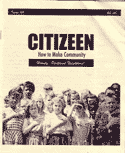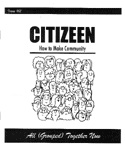Difference between revisions of "Citizeen"
(eliminating link to wikipedia) |
|||
| (10 intermediate revisions by 4 users not shown) | |||
| Line 1: | Line 1: | ||
[[Image:citizeen.gif|frame|Citizeen #1]] | [[Image:citizeen.gif|frame|Citizeen #1]] | ||
| − | '''Citizeen''' is a [[split zine]] written by [[Katin Imes]] and [[Diane Gilleland]]. Citizeen is a how-to zine for building | + | :''<small>This article is about the Portland, OR zine about community, for the North Hollywood, CA zine, see [[Citizine Magazine]].</small>'' |
| + | |||
| + | '''Citizeen''' is a [[split zine]] written by [[Katin Imes]] and [[Diane Gilleland]]. ''Citizeen'' is a how-to zine for building community - something most people seem to want more of, and something many of us have trouble finding. | ||
'''History of Citizeen''' | '''History of Citizeen''' | ||
After reading a lot of rather stodgy, social-science books about the nature of community -- and weathering many real-life ups and downs as they've tried to build their own local communities -- Katin and Diane decided to create an accessible resource to help people from all walks of life understand the advantages of community. The zine format was perfect, as it's a real-life format, easily carried out into the world and shared with other human beings. It was important to both authors that Citizeen not have any website component, because in their opinion, "Staring at computer screens does not tend to foster local community." | After reading a lot of rather stodgy, social-science books about the nature of community -- and weathering many real-life ups and downs as they've tried to build their own local communities -- Katin and Diane decided to create an accessible resource to help people from all walks of life understand the advantages of community. The zine format was perfect, as it's a real-life format, easily carried out into the world and shared with other human beings. It was important to both authors that Citizeen not have any website component, because in their opinion, "Staring at computer screens does not tend to foster local community." | ||
| − | + | === Citizeen #1 === | |
Citizeen #1 seeks to answer some basic questions: Why is community important? Who exactly makes up my local community? And how do I go about creating community around me? | Citizeen #1 seeks to answer some basic questions: Why is community important? Who exactly makes up my local community? And how do I go about creating community around me? | ||
| Line 12: | Line 14: | ||
# All the skills, tools, and access you currently have. (These give you opportunities to offer help to others.) | # All the skills, tools, and access you currently have. (These give you opportunities to offer help to others.) | ||
| − | |||
# All the skills, tools, and access you currently need. (These give you opportunities to arrange trades with others.) | # All the skills, tools, and access you currently need. (These give you opportunities to arrange trades with others.) | ||
| Line 19: | Line 20: | ||
Issue #1 also contains a worksheet to help you identify exactly who the people are that make up your own community. And most people who fill this sheet out are surprised to discover that their local community is much larger than they'd realized. This issue also delves into local currencies, the power of gossip to make or destroy communities, and tips for making connections with other people in your neighborhood right now. | Issue #1 also contains a worksheet to help you identify exactly who the people are that make up your own community. And most people who fill this sheet out are surprised to discover that their local community is much larger than they'd realized. This issue also delves into local currencies, the power of gossip to make or destroy communities, and tips for making connections with other people in your neighborhood right now. | ||
| − | + | [[Image:Citizeen2.jpg|frame|Citizeen #1]] | |
| − | Citizeen #2 | + | |
| + | === Citizeen #2 === | ||
| + | "All (Grouped) Together Now" | ||
| + | This issue is all about joining groups, including how to choose good groups that will work for you and the different types of groups. Charts and forms include: | ||
| + | * La Familia de Groups - a chart mapping out the structured-casual aspect of groups across their orientation: activities, intellect, or entertainment. | ||
| + | * What is the Group of Your Dreams - a quiz that will reveal exactly the kinds of groups you'd like to join. | ||
| + | * Group Resources - books, web sites, and places to find connections to groups you'd love. | ||
| + | "The Life Cycle of a Group" helps cast aside guilt and dragging ties to dying groups - focus that energy into vitalizing groups that meet current needs and desires! A key article in this issue explains "group mojo" and how to crank it up in any group. And, just like issue #1, each page is footered with a thought-provoking quote. | ||
| + | |||
| + | Selections from ''Citizeen'' appeared in volume nine of [[Zine Yearbook]], released in 2008. | ||
| + | |||
| + | |||
| − | [[Category:Zine]] [[Category:Split Zine]] | + | [[Category:Zine]][[Category:Zines from the U.S.A.]] [[Category:Split Zine]] [[Category:Oregon Zines]] [[Category:Zine Yearbook]] |
Latest revision as of 23:14, 30 March 2009
- This article is about the Portland, OR zine about community, for the North Hollywood, CA zine, see Citizine Magazine.
Citizeen is a split zine written by Katin Imes and Diane Gilleland. Citizeen is a how-to zine for building community - something most people seem to want more of, and something many of us have trouble finding.
History of Citizeen After reading a lot of rather stodgy, social-science books about the nature of community -- and weathering many real-life ups and downs as they've tried to build their own local communities -- Katin and Diane decided to create an accessible resource to help people from all walks of life understand the advantages of community. The zine format was perfect, as it's a real-life format, easily carried out into the world and shared with other human beings. It was important to both authors that Citizeen not have any website component, because in their opinion, "Staring at computer screens does not tend to foster local community."
Citizeen #1
Citizeen #1 seeks to answer some basic questions: Why is community important? Who exactly makes up my local community? And how do I go about creating community around me?
A key concept in Issue #1 is the "Personal Exchange Economy." Every one of us has our own Personal Exchange Economy, which is the sum total of:
- All the skills, tools, and access you currently have. (These give you opportunities to offer help to others.)
- All the skills, tools, and access you currently need. (These give you opportunities to arrange trades with others.)
The more you can exchange what you have for what you need, the more enmeshed you will be in your local community, and the more support and resources you will have available to you. A handy worksheet in the zine helps you assess the current state of your own Personal Exchange Economy.
Issue #1 also contains a worksheet to help you identify exactly who the people are that make up your own community. And most people who fill this sheet out are surprised to discover that their local community is much larger than they'd realized. This issue also delves into local currencies, the power of gossip to make or destroy communities, and tips for making connections with other people in your neighborhood right now.
Citizeen #2
"All (Grouped) Together Now" This issue is all about joining groups, including how to choose good groups that will work for you and the different types of groups. Charts and forms include:
- La Familia de Groups - a chart mapping out the structured-casual aspect of groups across their orientation: activities, intellect, or entertainment.
- What is the Group of Your Dreams - a quiz that will reveal exactly the kinds of groups you'd like to join.
- Group Resources - books, web sites, and places to find connections to groups you'd love.
"The Life Cycle of a Group" helps cast aside guilt and dragging ties to dying groups - focus that energy into vitalizing groups that meet current needs and desires! A key article in this issue explains "group mojo" and how to crank it up in any group. And, just like issue #1, each page is footered with a thought-provoking quote.
Selections from Citizeen appeared in volume nine of Zine Yearbook, released in 2008.

